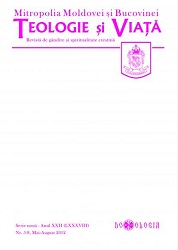„Filosofia creştină” ca hermeneutică şi euristică.
„Christian Philosophy” as Hermeneutic and Heuristic. Prolegomena on the Relationship between Theology and Philosophy
Author(s): Nichifor TănaseSubject(s): Christian Theology and Religion
Published by: Editura Doxologia
Keywords: Aristotelian logic; Christian Hellenism; Hermeneutics; Patristic spirituality; phenomenological Thomism
Summary/Abstract: The contestation of the originality of the Fathers led some modern exegets, as A.J. Festugière, in asserting the prevalence of Platonism in their mysticism, though himself stresses the inadequacy of the grace notion in Platon’s mysticism. Starting with Gregory of Nyssa and Dionysius the Christian Theology heads towards the theme of the Divine darkness – a theme without parallel in Platonism, a real originality in mysticism. Another challenge addressed to patristics comes from Adolf von Harnack, who insisted on the „Hellenism” of the Fathers. George Florovsky made an insistent pleading for the meaning/notion of „Christian Hellenism”, showing how Greek patristic thinking has avoided its closure into Greek philosophical systems, the heresies being nothing but an uncritical absorption of pagan Greek philosophy in the Christian understanding. H. Schäder is much more positive when he says that „the Christianization of Aristotelian logic in Byzantine theology” was made by changing the terms which are related: a fundamental Platonic idea of participation (methexis) with a central Aristotelian notion of energy, of updating (energeia) introduced by Aristotle in opposition to the Platonic scheme. The tradition of "Christian" textbooks of logic from the eighth century was an eclectic one, without going back to the original sources. Father John I. Ica jr. captures at St. John Damascene a middle way between Platonism’s essentialism and existentialist personalism. Methodios Fouyas shows how Palamas was himself „methodologically an Aristotelian one”, but „ontologically a Platonist”. In the West, on the other hand, the tomasian synthesis between Augustinian Neoplatonism and arabic Aristotelianism made A.D. Sertillanges to exclaim: „Thomas is more Aristotelian than Aristotle”. Finally, the twentieth century was, par excellence, the century of „Christian philosophy" as hermeneutics, but, as Marion shows, the definition of „Christian philosophy” proposed by Gilson can be read „not only as hermeneutics, but first and at the same time as heuristic”.
Journal: Teologie şi Viaţă
- Issue Year: 2012
- Issue No: 05+08
- Page Range: 77-111
- Page Count: 35
- Language: Romanian

